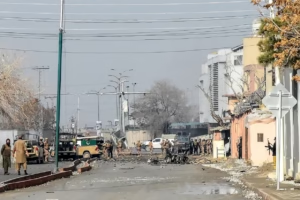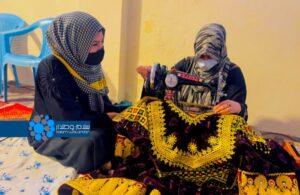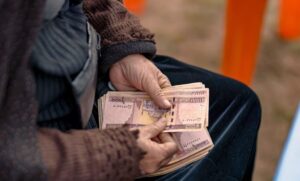The exchange marriages refer to a type of union where two families exchange their daughters to marry off their sons aimed at reducing the heavy costs of weddings, but according to the 11 Afghan women interviewed in this report, this has had devastating consequences.
Child marriage, lack of consent in marriage, experiences of violence stemming from the forced unions, lack of independence in the marital life, and deprivation of personal aspirations are some of the bitter outcomes of exchange marriages in Afghanistan. These issues have made the lives of these Afghan women incredibly difficult.
Sadaf, a woman who became a victim of an exchange marriage at the age of six and is now 28, recalls that due to financial hardship, she was married off in exchange for her older brother’s wedding. “My father wanted to marry off his son and gave me away at six. I wanted to study and go to school, but because of our economic struggles, I was exchanged so my brother could marry. I was too young at my brother’s wedding, unaware that it was also my wedding day. I was dancing and playing, then they stood me next to the bride and groom so people would know I was the exchange bride.”
Sabika, a 25-year-old woman, shares that she was engaged at 16 without her knowledge and consent. “I didn’t even know about my engagement until later. At first, I didn’t accept, but eventually I did. However, my life has never been good since then.”
Sahar, a 25-year-old from Takhar, lives in a home filled with tension, where she constantly has to compensate for the violence faced by her sister-in-law. “Whatever happens to her happens to me too. I’m not happy with the life I have. If you ask about our family relations, everything has been bad since marriage. Nothing is good between us.”
Nahida, 43, was forced into an exchange marriage by her mother to provide a wife for her maternal uncle. She recounts her husband’s indifference toward her and shares that both she and her husband were unhappy with the arrangement. “My uncle’s financial situation was poor, and because he liked a neighbor’s daughter, my mother, who had only one brother, arranged for me to marry the son of our neighbor. My uncle is now living happily in Australia, but my husband has never been kind to me. Every time there is an issue, he says, ‘I wish I hadn’t married you.’ It has been very difficult for me, even until now. Sometimes I wish this mistake had never been made.”
Mohammad Shoaib, a social and cultural expert, attributes the prevalence of exchange marriages in Afghanistan, especially in rural and remote areas, to a lack of awareness and economic challenges. He adds that media campaigns and government programs to reduce wedding costs could help prevent such practices.
“Due to ignorance and economic difficulties, people resort to exchange marriages,” he said. “This practice, which has existed for years, is wrong when done without the consent of both sides. It should be addressed through local media awareness, and the government is responsible for economic reforms and controlling wedding costs.”
Religious scholars also view marriage as the foundation of a healthy relationship built on love, respect, and mutual consent, and they consider exchange marriages to be contrary to Islamic law.
Ahmad Hakimi, a religious scholar, says: “According to Hanafi jurisprudence and the majority of scholars, such marriages are considered invalid because a woman isn’t property and should not be treated as such. If both sides consent, and the bride’s dowry is freely determined, it is permissible. But if that isn’t the case, it’s an invalid marriage and should be discouraged.”
Psychologists, based on modern psychological approaches, view exchange marriages as a form of trauma, leading to the mental health deterioration of women and future generations. Mohammad Shoaib Salangi, a psychologist, explains: “We refer to exchange marriages as a form of deviant or unhealthy unions. When women enter such marriages and are treated as commodities, they feel victimized, which leads to an identity crisis. They begin questioning who they are, feeling a loss of identity, and experiencing low self-esteem. This trauma not only affects the women but also impacts their future generations.
Women’s rights activists consider exchange marriages to be a form of trade with the destiny of young people, one that denies women the freedom to choose their partners and allows others to determine their futures. Shahla Arefi, a women’s rights activist, states: “In these transactions, the consent of the girls doesn’t matter. These marriages are a clear violation of women’s rights. Even the recent constitution affirms that this is a crime against the destinies of young people.”
Legal experts also affirm that exchange marriages have no legitimacy under both Islamic law and Afghanistan’s current laws. Girls facing such situations have the right to object and annul their marriages.
Abdul Shakur Dadras, a legal expert, says: “From the perspective of Islamic law and Afghanistan’s current legal framework, exchange marriages or marriage for financial reasons are not legitimate. In the Islamic legal system, if a woman is forced into such a marriage, she has the right to object, and the marriage must be annulled. This is a violation of national and international rights and is considered a form of violence.”
However, Saif al-Islam Khaybar, spokesperson for the Islamic Emirate’s Ministry of Promotion of Virtue and Prevention of Vice (MoPVPV), told Salam Watandar that the ministry’s inspectors have been raising awareness about exchange marriages and have prevented some cases. “Regarding exchange marriages, the ministry has instructed inspectors, mosque imams, and community elders to raise awareness and prevent such practices.”
It should be noted that exchange marriages in Afghanistan are influenced by cultural traditions and social pressures. In these marriages, individuals, particularly women, are forced to accept unions without having the freedom to choose their spouses.






